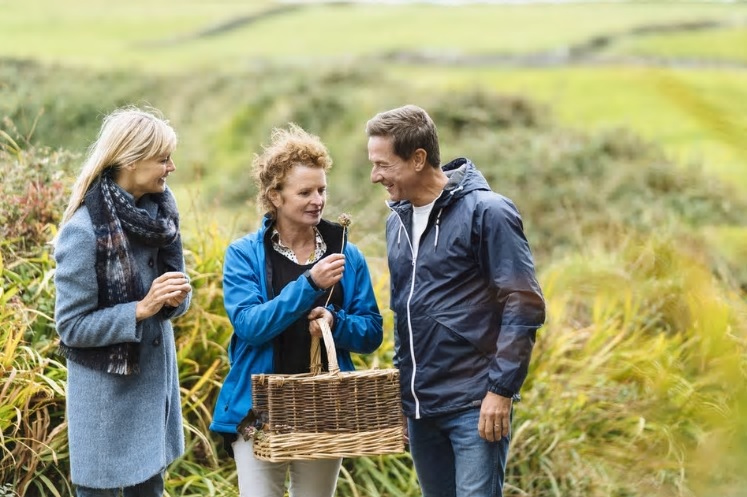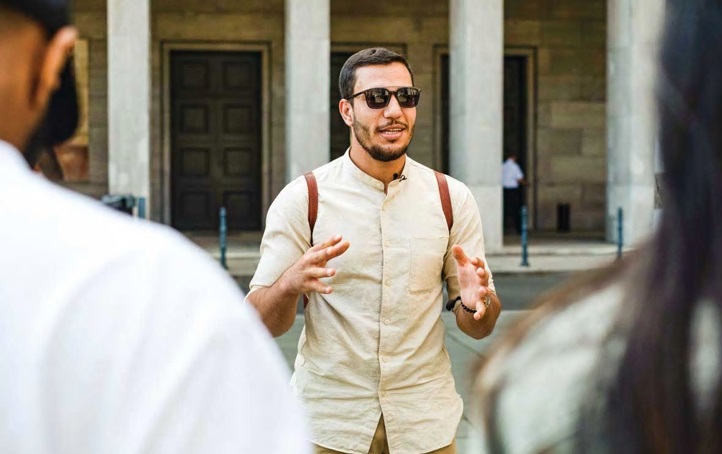-700x481.jpg)
Breaking Travel News interview: Shannon Guihan, chief sustainability officer, the Travel Corporation
The Travel Corporation has redoubled existing commitments to regenerative tourism across its dozens of brands with the launch of a new, five-year sustainability strategy.
Entitled How We Tread Right (HWTR), the document is centred on 11 goals designed to advance efforts to address areas such as climate change, overtourism and animal welfare.
It also outlines initiatives to strengthen efforts that address sustainable food production and responsible consumption, as well as diversity and inclusion.
The Travel Corporation’s chief sustainability officer, Shannon Guihan, explains: “We have launched a new strategy for the whole of the Travel Corporation, it guides all of our corporate and philanthropic efforts.
ADVERTISEMENT
“It is a five-year sustainability strategy, replacing the now outdated strategy that ended in 2019.
“We have been working on it for around ten months, and it presents 11 goals to govern what we do across our 40 or so brands.
“The targets are anchored to the United Nations Sustainable Development Goals - we did a materiality assessment between the problems in our industry, that way we can affect change against those challenges and make that meaningful across all of our brands.
“We were not looking to reinvent the wheel, we employed the tactics taken by the United Nations, interpreting them and utilising them in our own strategy.”
The goals include a plan to achieve carbon neutrality by 2030 or sooner, source half of all electricity from renewable sources by 2025 and to reduce food waste by 50 per cent across all hotels and ships over the next five years.
The full list can be seen here.
Speaking to Breaking Travel News, Guihan adds: “We are redoubling our efforts; it is a natural evolution from the first strategy.
“The 2012 strategy included resource use at virtually all of our office space, but this has now been expanded to every real-estate asset we have in the portfolio, for example – every property, every ship.”
A core component of the strategy is the launch of Make Travel Matter (MTM) experiences, which have been identified using an industry-first, proprietary assessment tool.
“The new strategy also presents Make Travel Matter experiences – TreadRight our teams were having discussions about how to measure the positive impact of our trips, and this is our answer to that.
“We took the Sustainable Development Goals and laid them over an experience perspective and developed a set of criteria through which we can assess the impact of these experiences and our trips,” adds Guihan.
“Those that meet the criteria are offered as Make Travel Matter experiences.”

To qualify for the Make Travel Matter tag, an experience must meet the criteria associated with at least one of goals outlined in the new sustainability document.
For example, a Make Travel Matter experience with Insight Vacations, where guests visit the Sheroes café in India, which supports and is run by female survivors of acid attacks.
The UN goal that this seeks to address is gender equality.
There are many more examples and in all, the Travel Corporation hopes half of its portfolio of trips will feature at least one Make Travel Matter experience.
“We have a number of brands, stretching across coaches, hotels and river cruise ships, so some of the goals are more applicable than others, depending on the brand,” adds Guihan.
“For example, the 50 per cent reduction of food waste over the next five years is largely going to be for the hotel brands, such as Red Carnation Hotels, and onboard Uniworld vessels.
“Make Travel Matter experiences, however, will stretch across all of our brands.”
Of course, with global travel in virtual suspended animation currently, the Travel Corporation has been offered an opportunity to reassess its policies before a much-hoped-for rebound next year.
Guihan continues: “With regard to Covid-19, I would say we must look it as a threefold opportunity; from the community’s perspective, from ours, and from that of the guest.
“We started this process in late October last year, but I think it is important to note that we did not remove any resources from the development of this plan and we have continued to support all our TreadRight projects throughout the pandemic.
“Corporate social responsibility continues to play a critical role at the Travel Corporation.
“The goals are set in concert with our chief executive, Brett Tollman, but everybody in every business function is incorporated in the process.
“Covid-19, though it has been massively destructive to the industry, has not lessened our focus on this area across all of our business functions.
“Within the organisation there has been an acceptance that sustainability and resilience are one and the same thing right now – sustainability will be closely tied to the recovery of the industry.”

Scepticism abounds when it comes to sustainability in the travel industry, though, with many companies accused of simply ‘green washing’ their activities.
For this reason, the Travel Corporation has been careful to set measurable, independently verified goals.
“We’re partnering with carbon finance consultancy South Pole to offer our guests offset opportunities on our trips,” says Guihan.
“Consideration of our supply chain is first and foremost in our minds, and we have just gone through the process of measuring the carbon footprint of every one of our itineraries.
“From this we are going to be introducing carbon neutral trips as we progress; we have put considerable brand resources into this area.
“We affect change by sharing best practice with our suppliers - on the use of single-use plastic, on local and organic food sourcing - and we have set goals in these areas.”
She adds: “When you are building a strategy like this, it is important to have smart goals that are measurable.
“Throughout the process of building our goals, we also examined how we would measure our progress and we have built and internal reporting structure to assess this.
“Reporting on something like this is vital, and we will be sharing the information annually in public impact reports from the end of 2021.”
But can tourism ever be truly sustainable?
With billions of international trips taken each year, would it not be better for travellers to simply move less as we seek to cut carbon emissions and slow the impact of climate change?
Perhaps unsurprisingly, Guihan thinks not.
She argues: “Over the past ten to twenty years, marketers have been extremely successful in making destinations reliant on travel and tourism – so it would be irresponsible to now walk away.
“Integrating sustainability into our operations is thus essential, but not everything in the industry is going to go that way.
“Tourism is a force for conservation efforts, community conservation and the support of local handicrafts – tourism can be a force for good.
“If everybody were able to go to the country they least understood once in their lives, would we not have fewer problems?
“Companies need to take a look at sustainability as a part of their long-term survival – we need healthy and happy communities in order for tourism to thrive.
“Tourism has grown without quality control for a long time, and sustainability is certainly a crucial part of its future.”
More Information
To launch How We Tread Right, the TreadRight Foundation enlisted its ambassadors - Céline Cousteau, activist and filmmaker; Sarain Fox, indigenous storyteller and activist; and Ami Vitale, National Geographic photographer to share how travel has impacted their lives, as travellers look to them to learn how they can make their travels matter.
Take a look at the results above.

